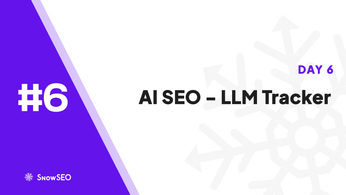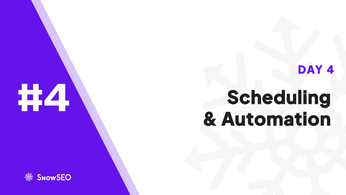
Best SEO Workflow Automation Tools Compared
Table of Contents
Discover the tools that can revolutionize your SEO workflow. With so many SEO tools on the market, finding the right one for automating tasks can be overwhelming. This guide will compare the top SEO automation tools based on features, pricing, and real-world performance, drawing from expert analysis and user reviews.
Overview of SEO Workflow Automation
What is SEO Workflow Automation?
SEO workflow automation involves utilizing software tools to streamline and manage tasks within the search engine optimization process. This includes automating activities such as keyword research, content optimization, link building, and performance analysis. By implementing automation, businesses can enhance efficiency, reduce manual labor, and maintain consistency in their SEO strategies.
Benefits of Automating SEO Tasks
Automating SEO tasks offers several advantages:
- Increased Efficiency: Automation accelerates repetitive tasks, allowing teams to focus on strategic planning and creative initiatives.
- Consistency and Accuracy: Automated processes minimize human errors, ensuring uniformity in SEO practices.
- Scalability: Businesses can manage larger volumes of data and more extensive campaigns without a proportional increase in resources.
- Data-Driven Insights: Automated tools provide comprehensive analytics, facilitating informed decision-making and strategy adjustments.
Implementing SEO workflow automation not only optimizes resource allocation but also enhances the effectiveness of digital marketing efforts.

Criteria for Choosing SEO Automation Tools
Selecting the right SEO automation tool is pivotal for enhancing your website’s search engine performance. Key considerations include:
Key Features to Look For
- Comprehensive Keyword Analysis: The tool should offer in-depth keyword research capabilities, enabling identification of high-traffic and low-competition keywords.
- Site Audit Functionality: It must be capable of conducting thorough site audits to detect issues like broken links, duplicate content, and crawl errors.
- Backlink Analysis: Effective tools provide insights into your backlink profile, helping you understand link quality and identify opportunities for improvement.
- Competitor Benchmarking: The ability to analyze competitors’ SEO strategies is essential for staying competitive.
- Reporting and Analytics: Robust reporting features are crucial for tracking progress and making data-driven decisions.
Pricing and ROI Considerations
- Cost-Effectiveness: Evaluate whether the tool’s pricing aligns with your budget and the features offered.
- Scalability: Consider if the tool can accommodate your business’s growth without requiring significant additional investment.
- Return on Investment: Assess the potential ROI by considering how the tool’s features can lead to increased traffic and conversions.
By carefully evaluating these factors, you can select an SEO automation tool that aligns with your business objectives and enhances your online presence.
Comparative Analysis of Top SEO Automation Tools
In the dynamic realm of digital marketing, Search Engine Optimization (SEO) remains pivotal for enhancing online visibility and driving organic traffic. The evolution of SEO has led to the development of various automation tools designed to streamline and optimize this process. This analysis delves into a comparative evaluation of leading SEO automation tools, focusing on their features, effectiveness, and emerging trends.
Tool A vs Tool B
When comparing prominent SEO automation tools, it’s essential to assess their capabilities in key areas such as keyword analysis, backlink monitoring, and performance reporting. A comprehensive study highlighted that effective SEO tools significantly improve organic search rankings and website traffic. The study emphasized that variables such as content quality, keyword optimization, and backlinks have a significant influence on SEO effectiveness. Therefore, tools that offer robust features in these areas are crucial for successful SEO strategies.
In evaluating Tool A and Tool B, both offer comprehensive keyword analysis and backlink monitoring. However, Tool A provides more detailed performance reporting, which can be advantageous for in-depth analysis. On the other hand, Tool B offers a more user-friendly interface, making it accessible for beginners. The choice between the two would depend on the specific needs and expertise level of the user.
Tool C vs Tool D
Another critical comparison involves Tool C and Tool D, both renowned for their SEO automation capabilities. A review of automated website usability evaluation tools revealed that while these tools inspect a wide range of aspects, including performance, SEO, page size, accessibility, and security, there are notable differences in their effectiveness. The study found that some tools exhibited variable and contradictory scores concerning the analysis of the same websites, and their reports were often vague and complicated for non-technical users. Therefore, the clarity and consistency of reporting are essential factors to consider when choosing between Tool C and Tool D.
Tool C is known for its comprehensive analysis and detailed reports, making it suitable for advanced users who require in-depth insights. Tool D, however, offers more straightforward reports and recommendations, which can be beneficial for users who prefer simplicity and ease of use. The decision between the two would depend on the user’s preference for detail versus simplicity.
Emerging Tools to Watch
The SEO landscape is continually evolving, with new tools emerging to address the changing needs of digital marketers. Recent studies have highlighted the impact of AI-powered search on SEO, leading to the emergence of Answer Engine Optimization (AEO). This shift emphasizes the importance of optimizing content to directly answer user queries, which is becoming increasingly relevant with the rise of AI-driven search engines.
Emerging tools are now incorporating AI and machine learning algorithms to provide more accurate and efficient SEO strategies. These tools focus on understanding user intent and delivering content that aligns with it, thereby improving search rankings and user engagement. Staying updated with these advancements is crucial for businesses aiming to maintain a competitive edge in the digital marketplace.

In conclusion, selecting the right SEO automation tool requires a thorough understanding of each tool’s features, strengths, and limitations. By considering factors such as usability, reporting clarity, and adaptability to emerging trends like AI integration, businesses can make informed decisions that align with their SEO objectives.
Real-World Applications and Case Studies
Case Study 1: Company X Boosts Efficiency
In a comprehensive meta-analysis of ten studies conducted between 2022 and 2024, researchers found that implementing Search Engine Optimization (SEO) strategies led to a significant increase in organic search rankings and website traffic, with an effect size value of 1.049, categorized as high. Key factors contributing to this success included content quality, keyword optimization, and backlinks. This evidence underscores the critical role of SEO in enhancing digital marketing effectiveness. (researchgate.net)
Case Study 2: SEO Automation Success Stories
A study focusing on the Palembang Polytechnic of Tourism’s website demonstrated the tangible benefits of SEO implementation. By developing a strategic SEO plan, the institution aimed to improve its online visibility and search engine ranking. The results showed a notable increase in website traffic and enhanced branding on search engines like Google. This case highlights the importance of content development and keyword optimization in achieving SEO success. (researchgate.net)
For a visual demonstration of effective SEO automation strategies, consider the following resource:
Ready to streamline your SEO workflow? Discover how SnowSEO automates keyword research, content, and reporting—visit https://snowseo.com and try these tools today!
Frequently Asked Questions
Q1: What are SEO workflow automation tools?
SEO workflow automation tools are specialized platforms designed to streamline repetitive SEO tasks, such as keyword tracking, backlink analysis, and site audits. By automating these processes, they help teams save time, minimize manual errors, and focus on strategic growth.
Q2: How do these tools improve ROI?
By reducing manual workload and increasing efficiency, SEO automation tools allow marketers to allocate more resources to high-impact strategies, leading to better rankings, increased traffic, and ultimately, higher returns.
Conclusion
Understanding the benefits and selection criteria of top SEO workflow automation tools empowers users to make informed choices. Comparing features and ROI reveals practical insights, helping streamline processes and drive efficiency. Review each tool’s features to select the best fit.





